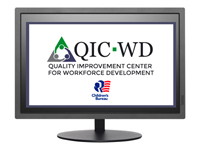Child Welfare Quality Improvement Center for Workforce Development (QIC-WD)
Date of this Version
9-2021
Document Type
Article
Abstract
The Implementation Team
The QIC-WD worked with Nebraska Division of Children and Family Services (DCFS) to establish an implementation team to lead the development and implementation of their intervention to address secondary traumatic stress. The implementation team was called the Nebraska Workforce Project Team. It included a representative from each of the five geographic regions of the state (known as a Service Areas), a representative from each staff level (worker, supervisor, administrator), the Site Implementation Manager (SIM), the Data Coordinator, sponsors (the DCFS director and Human Resources [HR] director), and three members of the QIC-WD (representing expertise in workforce, implementation, and evaluation). The SIM and Data Coordinator positions were partially funded by the QIC-WD, all other representatives participated as part of the “other duties, as assigned” aspect of their job.
The Nebraska Workforce Development Project Team met monthly, face-to-face for a full day in Lincoln, Nebraska for the first year of the project. Meetings decreased in frequency to quarterly in 2019, and then the team met as needed in the final years of the project. Meetings were held virtually when the agenda was short or due to the pandemic in 2020 – 2021. The meetings were led by the SIM.
The implementation team was responsible for:
- Serving as project champions
- Communicating project updates to their service areas
- Reviewing and interpreting the needs assessment data
- Selecting/developing an intervention
- Considering how the intervention would integrate into existing systems and agency structures
- Considering if any agency policies or procedures impact the intervention
- Planning for implementation
- Reviewing program data to inform the delivery and ongoing sustainability of CFS Strong
- Planning for sustainability
- Developing job descriptions for Resilience Alliance (RA), Peer Support Group (PSG), and Restoring Resilience Response (RRR) facilitators
- Determining fit of intervention with agency priorities
The implementation team was guided by a charter that detailed the role of team members, the process for decision making, the frequency of meetings, etc. The charter was reviewed and updated as needed over the course of the four-year project. The team established workgroups to oversee specific activities related to the intervention: (1) Communications Workgroup to develop the communications plan and lead communication activities; (2) Hiring Workgroup to identify external facilitators to lead RA and RRR; (3) Content Workgroup to create content for Resiliency Reminders and the PSG guidebook; (4) Kick-off Workgroup to plan the initial intervention kick-off event(s); (5) RRR Workgroup to plan the implementation of RRR; and (6) Sustainability Workgroup to use data and lessons learned to inform future agency activities.
Preparing for Implementation
The Nebraska Workforce Project Team decided on a series of activities to help the agency prepare for the implementation and evaluation of the intervention:
- A letter from the Director of the DCFS, sharing a summary of what the Nebraska Workforce Project learned through the needs assessment process and next steps
- Kick-off meetings with (1) leadership and (2) supervisors
- A video highlighting the challenges of STS and the support leadership has for CFS Strong
- Introduce facilitators to supervisors involved in intervention
- On-going communications from members of the Nebraska Workforce Project to colleagues in each Service Area through staff meetings
- In-person survey administration led by Nebraska Workforce Project team, in collaboration with QIC-WD evaluator, to gather baseline data and assess readiness for evaluation and implementation
Implementation Supports
Implementation supports were primarily used to support fidelity to the CFS Strong model (e.g, curricula) and inform the Nebraska Workforce Project Team of successes and challenges that could be celebrated or remedied through implementation of the model. Key implementation supports included resources:
- For RA facilitators: Resilience Alliance training manual, job description, a one-day facilitator training, monthly technical assistance calls with an experienced RA facilitator from another jurisdiction, a shared folder to save activities and resources used in RA, a point of contact to schedule meeting space/time for RA sessions, a standardized observation form to gather information on facilitation, and a monthly summary report containing aggregated participant feedback.
- For PSG group facilitators: A Peer Support Group guide (created by the Content Workgroup) and an observation form to gather information on PSG delivery.
- For the Nebraska Workforce Project Team: summary data from the on-line participant and facilitator feedback tools was reviewed to inform the need for additional communication about implementation.
- For CFS Strong Participants: Resilience Alliance Participant Manual and weekly resiliency reminders sent via text message during RA and PSG.
- For RRR facilitators: virtual training conducted by New York Society for Prevention of Cruelty to Children and participant and facilitator feedback forms.
Included in
Industrial and Organizational Psychology Commons, Performance Management Commons, Public Policy Commons, Social Welfare Commons, Social Work Commons, Training and Development Commons


